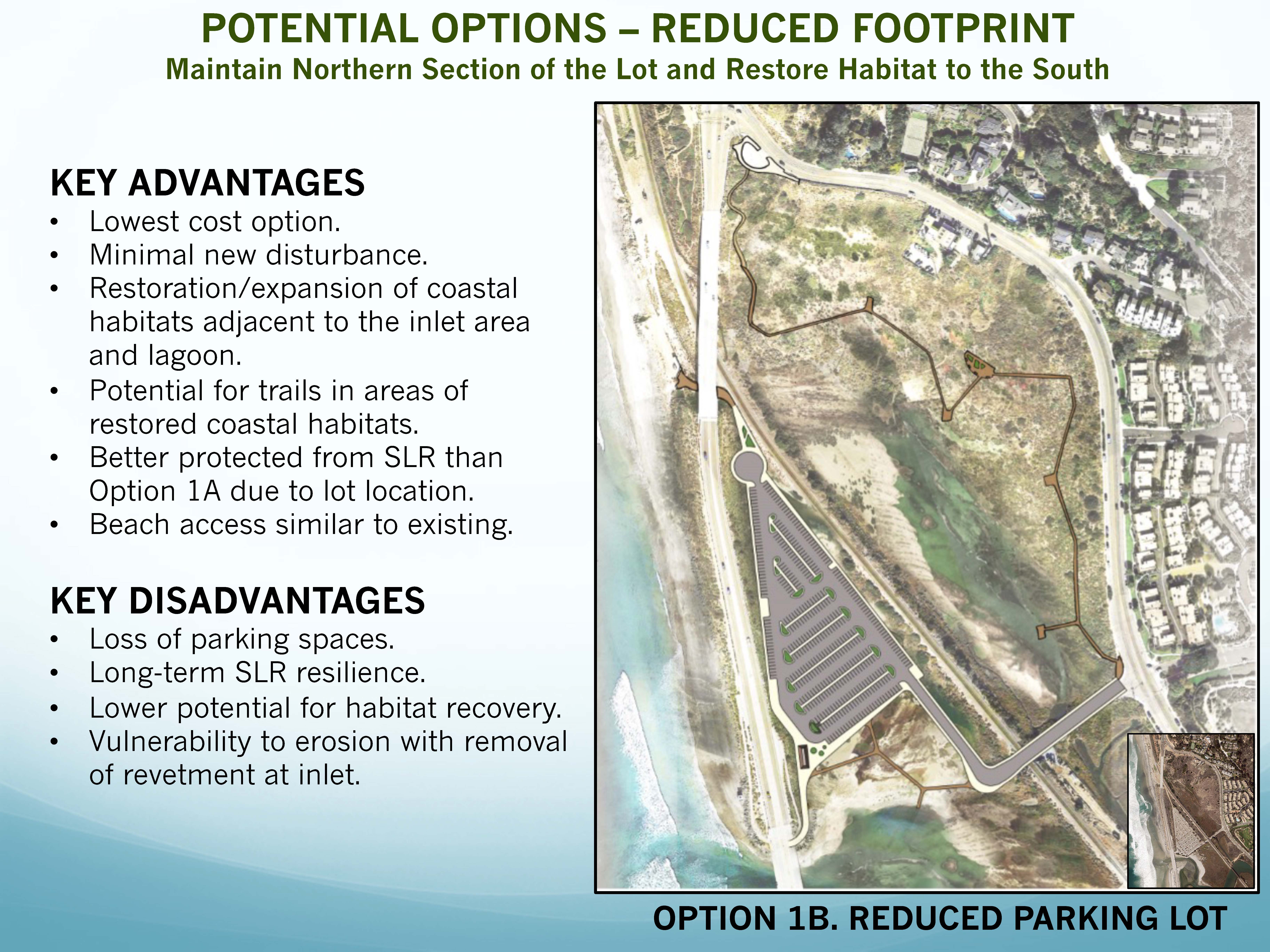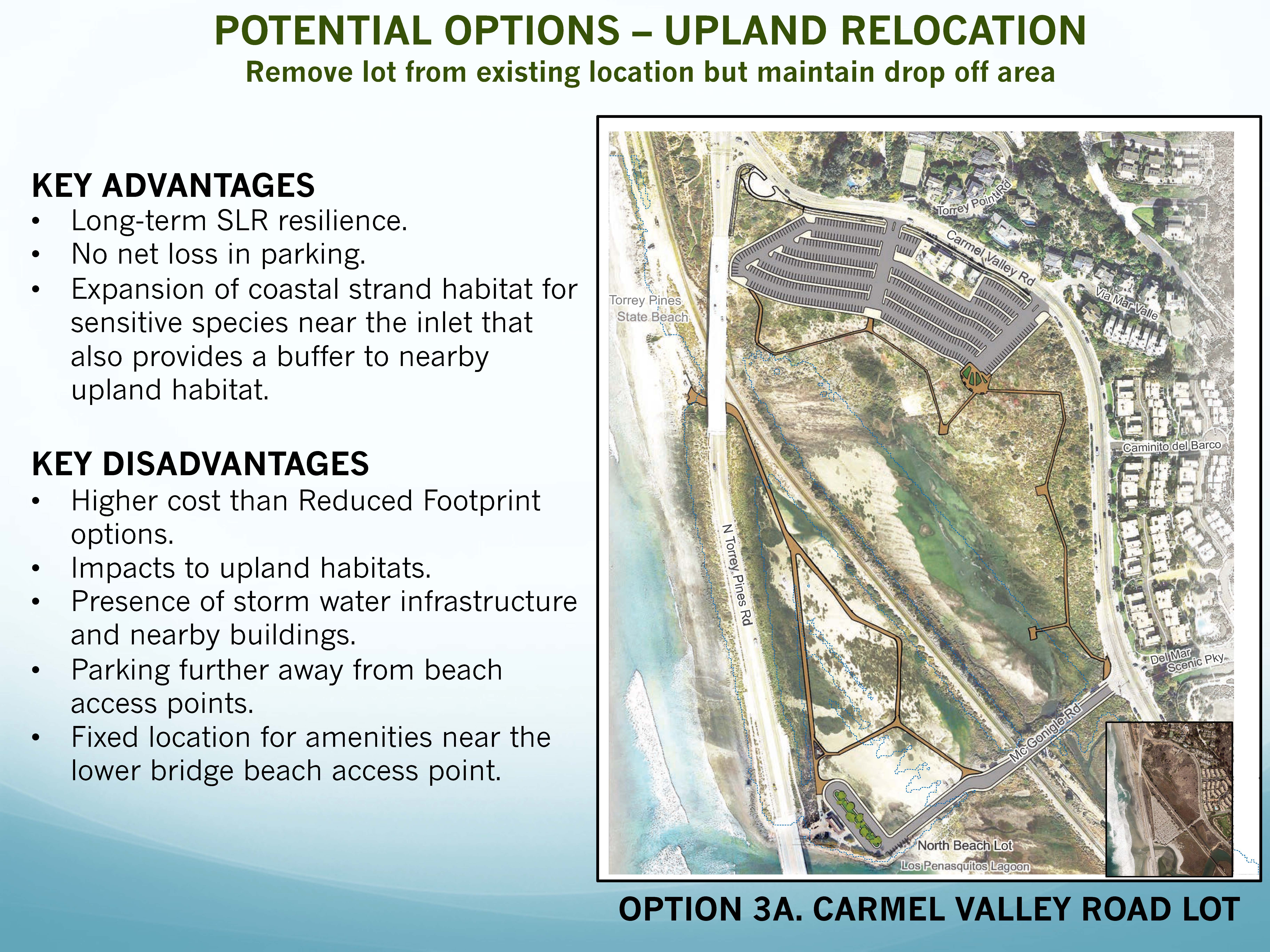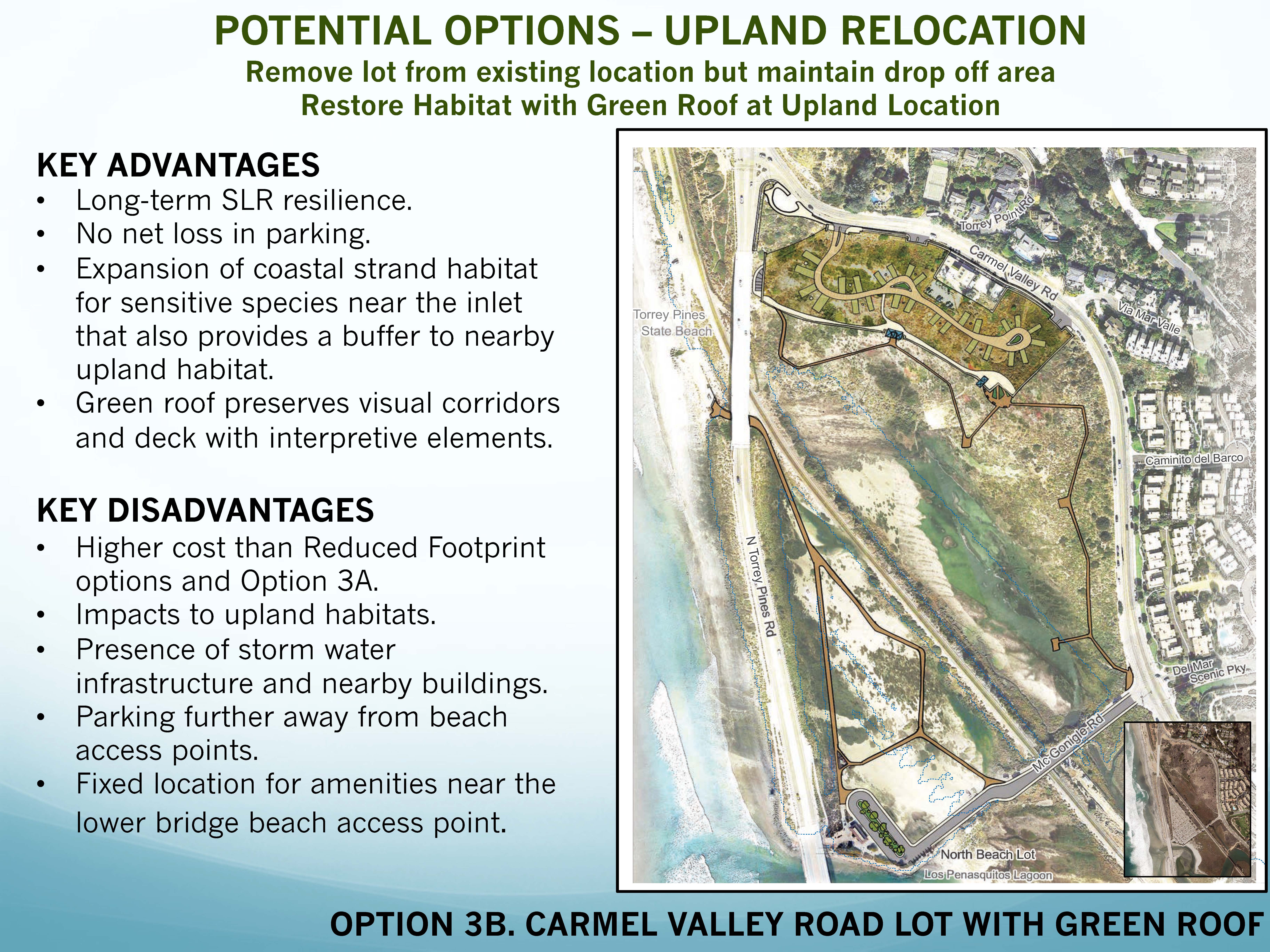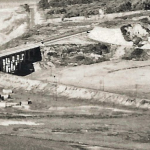Managed retreat of the North Beach Parking Lot was identified as a priority project in the recently updated Los Peñasquitos Lagoon Enhancement Plan. Funded through a Climate Ready Grant, the project will look to maximize the potential of the North Beach Parking Lot through a collaborative engagement process to identify 3 different feasible alternatives for redesigning, and potentially, relocating the parking lot and re-imagining how the site could be utilized while being resilient to the impacts of climate change that includes sea level rise.
Currently, the North Beach Parking Lot provides access to the northern portion of Torrey Pines State Natural Reserve including Los Peñasquitos Lagoon, Torrey Pines State Beach and regional trail networks that include the California Coastal Trail and Trans County Trail. However, beach access is vulnerable to sea level rise and needs to be redesigned. Redesign may include managed retreat that includes modifications to the existing beach access points and re-configuring or relocating critical infrastructure and amenities to preserve their public use while reducing maintenance and maximizing ecological and community benefits. The redesign or relocation of the North Beach Parking Lot in the context of a larger multi-beneficial project would ensure continued access to these natural areas for the public that includes nearby residents and surrounding low-income communities. The project partners will explore how to maximize the co-benefits this valuable space could provide, including ecological, educational, and recreational opportunities.
In addition to resilience to sea level rise there are other key climate change concerns including vector control, storm water runoff and improved sewage management. Currently, freshwater inputs from the lot and poor circulation upstream of McGonigle Road due to an obstructed culvert have resulted in vector control issues that threaten park visitors and nearby residents due to mosquitos that can transmit brain encephalitis, such as West Nile virus, to human hosts within a 2-mile radius of the Lagoon. Climate change will most likely exacerbate the current issue and potentially introduce additional vector-borne illness that include Zika, dengue, chikungunya and yellow fever viruses to areas surrounding the Lagoon if effective vector management is not supported through improvements to the infrastructure that contribute to vector breeding due to freshwater inputs and ponded water. The Feasibility Study will look to improve flows under McGonigle Road through design elements that would include replacing the damaged culvert or elevating the roadway on a short bridge span to improve wildlife movement. Storm water inputs from the parking lot impact the Lagoon’s water quality as untreated runoff carries pollutants from the parking lot’s hardscape into the lagoon waters. Changes in precipitation patterns resulting from climate change will only exacerbate water quality issues as we experience more extreme and intense storms. The Feasibility Study will address storm water management needs by evaluating modern approaches that include bioswales and other green methods of onsite detention and treatment to reduce or eliminate direct discharges to the Lagoon. Located near the beach entry point, the bathroom facilities are vulnerable to sea level rise and coastal flooding. The proposed project will develop and assess alternatives to relocate and modernize the bathroom and other infrastructure components with elements that include “low-flow” toilets, solar panels and improved sewage collection and treatment.
The Project will provide the following multiple benefits:
Provides an example to coastal planners and state agencies of managed retreat using the living shoreline approach and other nature-based methods for climate change adaptations in coastal areas with high volumes of public use.
Supports applied science efforts as they relate to climate change modeling and adaptation by integrating climate science, engineering and ecology with on the ground habitat restoration and construction of North Beach Parking Lot improvements and related facilities.
Enhanced accessibility to Los Peñasquitos Lagoon and Torrey Pines State Beach through improved connections to active transportation routes (vehicular, bike and pedestrian).
Increased educational and interpretive opportunities to support coastal stewardship with outreach focused on schools within the watershed, especially those in disadvantaged communities.
Recovery, protection and preservation of habitats native and historic to Los Peñasquitos Lagoon in areas that are currently hardscape and public facilities (e.g., bathrooms).
Supports resiliency of listed birds and special status plants species by expanding essential sensitive habitat areas and buffer zones adjacent to transportation infrastructure and other urban developments.
Improved irrigation runoff, storm water and sewage management by relocating outdated facilities and incorporating nature-based approaches such as bioswales and rain barrels.
Supports vector management and native salt marsh habitats through improved conveyance of tidal waters under McGonigle Road.
Potential creation of a wildlife corridor under McGonigle Road to improve accessibility and safety for wildlife moving east and west of this elevated roadway.
Replacing hardscaped areas with native vegetation to promote carbon sequestration and heat reduction in urban areas.
Enhanced public access through improved connectivity with beach access points and established trails, along with improved amenities (bathrooms, educational facilities).
Enhanced public safety through establishment of supporting facilities for State Parks’ staff that include first responders (lifeguards and rangers) and maintenance staff.
STAKEHOLDER OUTREACH AND ENGAGEMENT
Stakeholder outreach and engagement will occur through a series of virtual public workshops, online surveys and direct engagement to help inform the design of the alternatives and provide insight with regard to user groups preferences and priorities. The first public workshop was held in January with the presentation available by clicking on the following link: Preserving Public Access Presentation 1. The second public workshop was held in March with the presentation available by clicking on the following link: Preserving Public Access Presentation 2.
Please take a few minutes to fill out our public surveys.
Survey 1. Tell us about yourself, what you like about the north beach parking lot and how it could be improved by clicking here.
Survey 2. Grade each of the concept design options and let us know how they can be improved. Your input will help guide which concept designs move forward and how they can be modified to meet user group priorities and expectations by clicking here. Examples of the some of the proposed concept design options are provided below:





